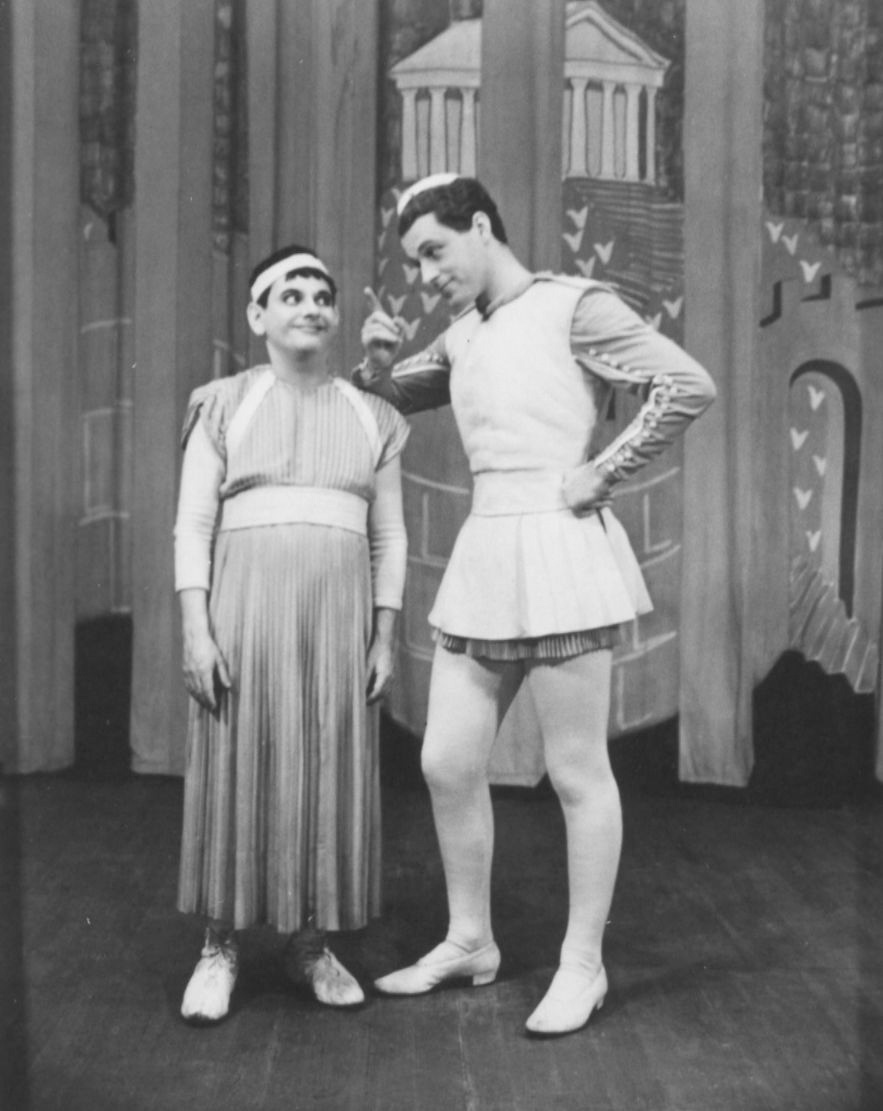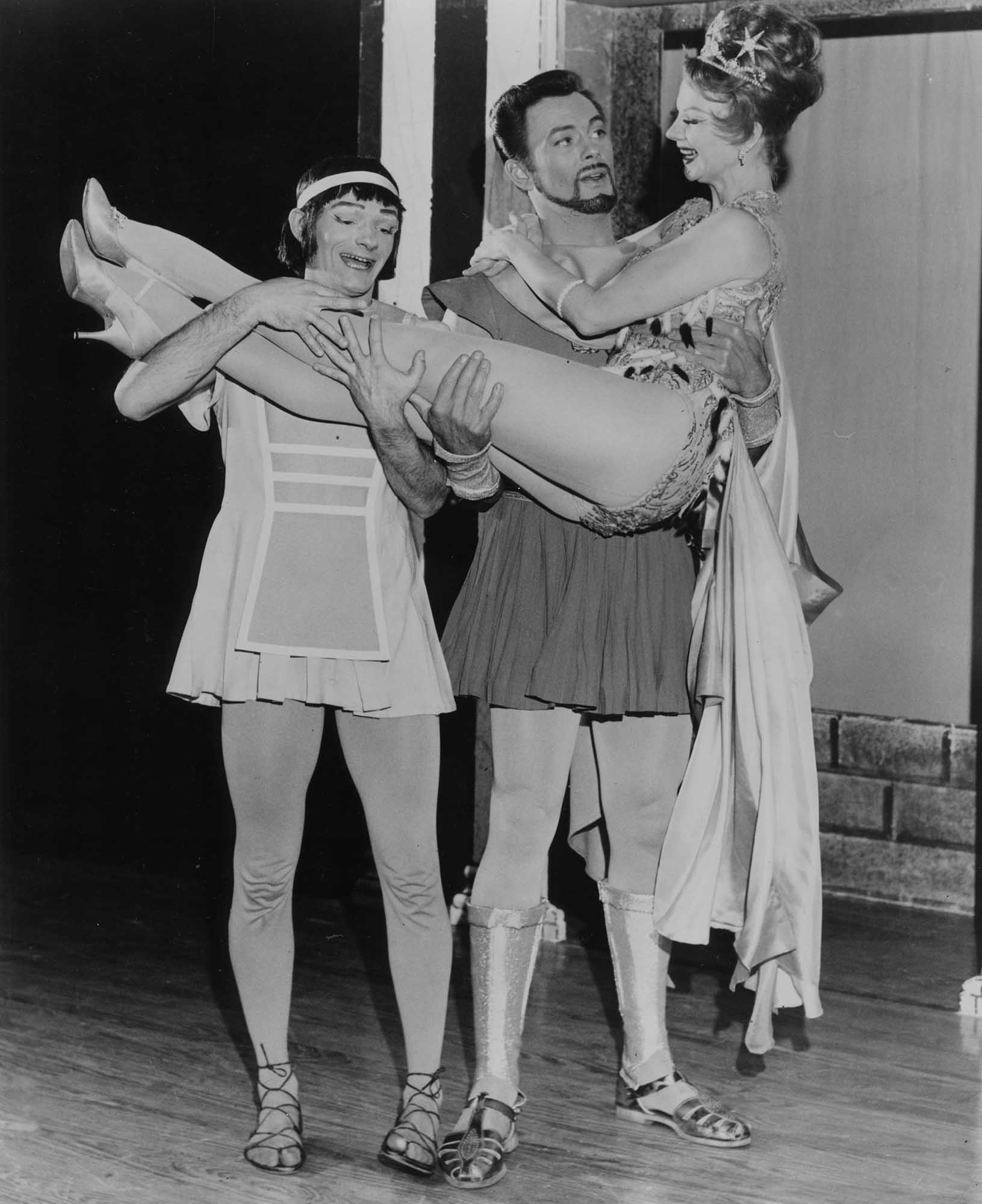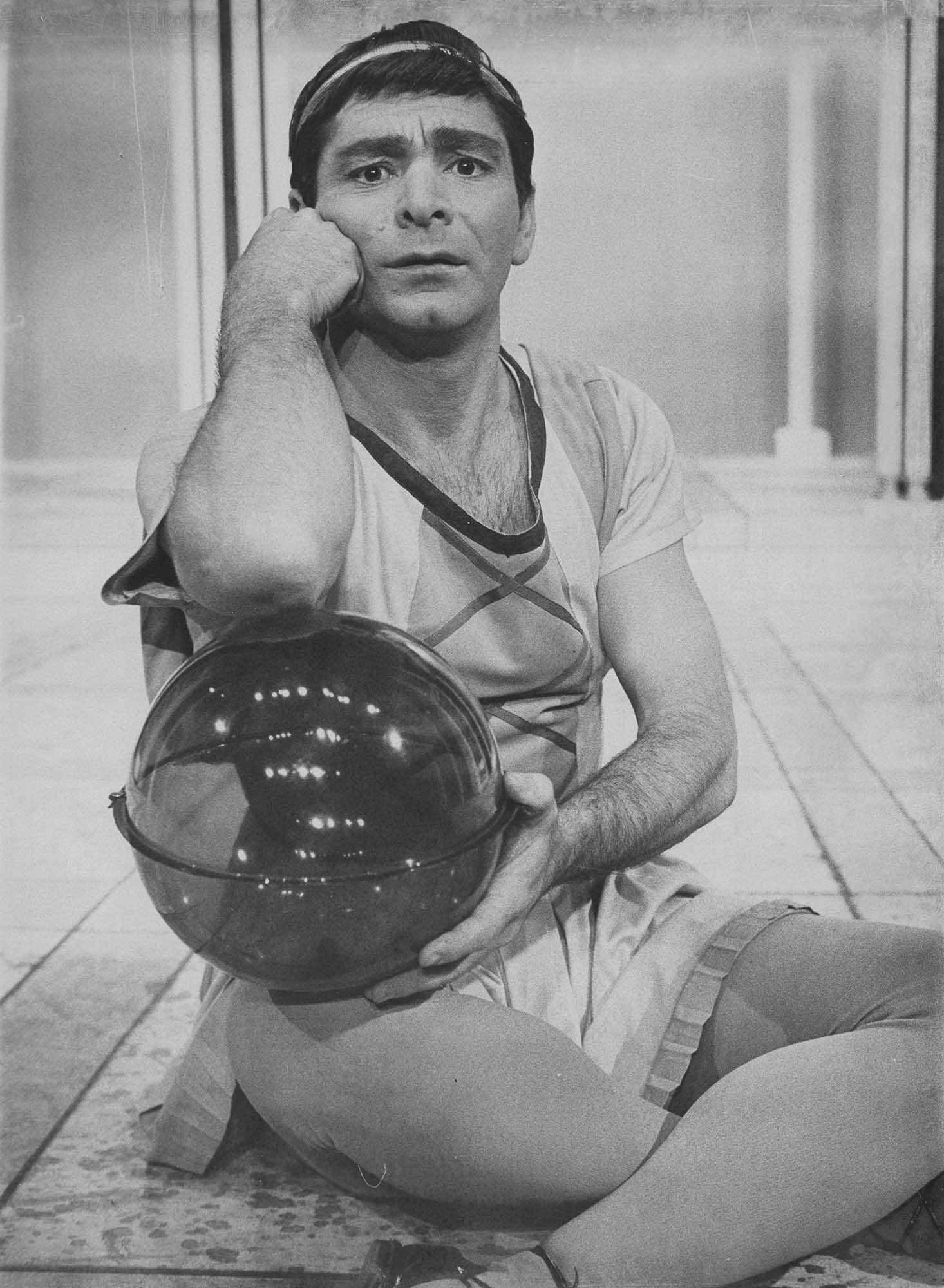The Boys from Syracuse Synopsis
ACT ONE
In ancient Greece, citizens of Ephesus gather as Aegean, a man from their rival city of Syracuse, begs for mercy from their duke. The Duke refuses, declaring that Aegean will be executed. When asked why he came to Ephesus, Aegean says he had twin sons, both named Antipholus, who had twin servants, both named Dromio, and were separated in a shipwreck. He’s come to Syracuse to find them (“He Had Twins”).
Meanwhile, Antipholus and his servant, Dromio of Ephesus (one half of Aegean’s missing quartet) make their way home while avoiding a tailor who is asking Antipholus for payment. At the same time, Antipholus and Dromio of Syracuse, newly arrived in Ephesus, realize they are unsafe in this hostile city. They change their dress to blend in so that Antipholus S. can continue searching for his family. Just as they are about to leave, the local tailor mistakes them for their Ephesian counterparts, and invites them in to try on new clothes. The merchant approves of their new garb and says they should be able to leave tomorrow. Antipholus S., tired of six months of travel, is eager to return to his homeland (“Dear Old Syracuse”).
Confusion abounds when Dromio E. addresses Antipholus S. as his master, and Antipholus S. chases after him, thinking Dromio E. has stolen the gold he gave him. In hiding, Dromio E.’s wife, Luce, finds him (“What Can You Do with A Man?”).
In the house of Antipholus E., Adriana, his wife, bemoans her husband’s long absences. Her sister, Luciana, tells her to be patient, but Adriana believes she’s being as patient as she can be while weaving tapestries to distract from her loneliness (“Falling in Love with Love”). Dromio E. reports back to Adriana: Though he found Antipholus (of Syracuse, not her husband of Ephesus), Antipholus only chased him down asking for gold, and he didn’t understand Dromio E.’s insistence that he come home for dinner. Frustrated, Adriana sets off to find her husband and bring him home.
In the town square, Antipholus S. accosts Dromio S. for joking with him about not having his money and mentioning a wife waiting at home. As Antipholus S. prods him for answers, Dromio S. backs away, dumbfounded. Adriana arrives and mistakes Antipholus S. for her husband. She is humiliated when he doesn’t recognize her as his wife; Luce has a similar confusion with Dromio S. They all blame Dromio S., whom Luce and Adriana accuse of lying, but Antipholus S. is also very confused, having no idea who Adriana or Luce is. Adriana decides to trust that his actions have more reason than she knows. She doesn’t wish to quarrel any longer, and kisses Antipholus S. With that, Adriana and Luce take Antipholus S. and Dromio S. home with them, as a peddling sorcerer tries to impress them with illusions.
Three courtesans enter the town square and begin to prepare themselves for the evening. Antipholus E. emerges from the courtesans’ quarters, bidding them goodbye as he heads home to his wife. When the courtesans joke about his marriage, he surprises them with quoted sentiments from Adriana that are so poetic, they should be put to music (“The Shortest Day of the Year”).
Meanwhile, Adriana is happy to have her “husband” home, while Antipholus S., waiting while she prepares, simply assumes he’s dreaming. Adriana’s sister Luciana comes down to read to him while he waits, and he instantly falls in love with her. She finds herself impulsively drawn to her sister’s strangely transformed husband. They decide pragmatically that the deep, sudden feeling they share cannot be what they suspect (“This Can’t Be Love”). Luciana awakens from her dreamy state and rushes out. Dromio S. comes in, terribly distressed, unsure of who he is and whom he serves. He hides as Luce comes in looking for him and when Adriana returns, she demands he return to Luce’s quarters. The two are taken by their ladies in waiting; Antipholus S. with Adriana, and Dromio S. with Luce, while Luciana is left alone to realize that it is love after all.
On the street outside the house, Antipholus E. and Dromio E. anticipate seeing their wives. Dromio E. fears the beating Luce will give him and Antipholus E. looks forward to a romantic encounter with Adriana, but when they arrive, the door is locked. The men shout up to Luce and Adriana, but the women command them to go away, thinking their husbands are already in bed with them. A town corporal gets involved, telling them to calm down, but Antipholus E. and Dromio E. grow increasingly angry and begin pounding on the door. A crowd joins in to support them (“Let Antipholus In”).
Later, at the courtesan’s establishment, Antipholus E. and Dromio E. take refuge, but Antipholus E. is distracted and sad about being refused from his home by his own wife. To help him relax, his courtesan offers some entertainment, a ballet of Pygmalion and Galatea, while he awaits returning home the next day.
ACT TWO
In front of Adriana’s house the next morning, maids and merchants sing in tribute as they watch the courtesans make their way home (“Ladies of the Evening”). The maids tell Adriana that the men wound up at the courtesan’s establishment the night before. Luce believes her Dromio (S.) has been acting peculiar since he arrived yesterday. She catches him acting flirtatious with one of the maids and, knowing that he at least has desires, laments that they are not for her. She wonders why they couldn’t be one of the few happy couples in the world (“He and She”).
Alone, Dromio S. begs his boss to escape the house, but Antipholus S. doesn’t want to leave Luciana. Upon reflection, however, he tells Dromio S. to go to the wharf and see if any ships are headed back to Syracuse; they should make a run for it. Just then, Angelo the jewelry merchant drops off a chain that Antipholus E. had ordered. Antipholus S. affectionately bids Luciana farewell and tells her that nothing happened with her sister the night before. He promises that, though he may never return, he’ll always remember her (“You Have Cast Your Shadow on the Sea”).
In the town square a week later, Angelo the goldsmith tells Merchant E. that Antipholus E. still owes payment for a gold chain. Dromio E., a corporal and Antipholus E. arrive. Antipholus E. doesn’t have enough money on his person to pay Angelo, and he doesn’t realize the gold chain has already been delivered. The two parties begin arguing and the corporal steps in. Just then, Dromio S. enters, confusing Antipholus E. for his boss, Antipholus S. The confusion worsens, and Antipholus E. instructs Dromio S. to run back to his home to retrieve money to pay for bail. With great fanfare, the corporal hauls Antipholus E. off to jail (“Come With Me”).
The Sorcerer pedals magic to Dromio E., offering him the “Father’s Day special,” but Dromio cannot be bothered. Dromio E. is attending the execution of Aegean, and he feels bad for the old man; just before she died, Dromio’s own mother told him that he was a twin, like Aegean’s sons. Reconsidering, Dromio asks the sorcerer to show him a vision of his brother. The sorcerer goes to get his crystal ball as Dromio sings out a wish for reunion (“Big Brother”). The sorcerer returns with the crystal ball, through which Dromio E. momentarily sees his brother, Dromio S. (“The Ballet”).
Back at Adriana’s house, Luciana cries and confesses that Antipholus said he loved her, not Adriana. Adriana brushes it off while Luce also complains about her strange-acting Dromio. Together, the three ladies commiserate over the sweet-sounding song they sing to keep their marriages pleasant (“Sing for Your Supper”). Dromio S., exhausted, rushes in and retrieves the money before and hurrying back out to save Antipholus E. from being arrested.
In the town square, Antipholus S. awaits the return of his Dromio with the bail money. He tells Merchant S. all he’s endured: being in love with a woman who thinks he’s her sister’s husband, being greeted on the street by strangers who treat him like old friends and other bizarre and unexplainable events. The merchant assures him everything will work out and leaves just as Dromio S. arrives. A courtesan confuses Antipholus S. with Antipholus E. and begins flirting with him. Considering himself engaged, Antipholus S. refuses the courtesan’s advances, but, feeling guilty, offers her the chain he apparently promised her. Dromio S. gets involved, and when they refuse to hand over the gold chain, the courtesan demands the ring that she gave him. Of course, Antipholus S. has no ring, as she actually gave it to Antipholus E. Antipholus S. and Dromio S. make an insistent exit, and the courtesan tells the approaching Luce that all men are crooks. All she, or any woman, wants is an honest man (“Oh, Diogenes”).
Outside the temple, Angelo sees that Antipholus S. is wearing the gold chain he previously claimed not to have. Angelo and Merchant E. confront Antipholus S., but he denies any wrongdoing; he even offers to return the chain. They both call each other liars and draw their swords and begin to fight. Adriana, Luciana, Luce and the courtesans stumble upon the scene and argue over Antipholus’ actions. A seeress from the temple tries to temper the women’s conflict when suddenly, from the temple, the Duke announces the beginning of Aegean’s execution. Adriana tries to appeal to the Duke about her troubled husband when Antipholus E. appears, followed by Dromio E.
Aegean recognizes Antipholus E. as his long-lost son just as Antipholus S. and Dromio S. appear. Aegean, his two sons and both Dromios are all reunited, and the confusing series of events is clarified. Aegean is pardoned, and he suddenly recognizes the seeress from the temple as his wife, the mother of his children (“Happy Ending (Finale)”).



